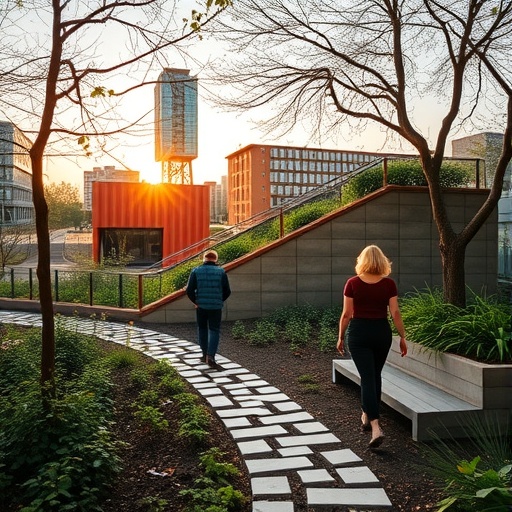Recent research conducted by the team of Lin et al. delves into the intricate relationship between nature connection, wellbeing, and pro-environmental behavior within urban settings. This study not only highlights the psychological aspects of environmental engagement but also aims to identify a “regional sweet spot” where urban residents can achieve optimal interaction with nature. The study appears in the well-regarded journal Ambio and is set to be published on August 31, 2025.
Urban living has transformed dramatically over the decades, with many citizens now residing in densely populated areas that often lack adequate natural spaces. This research emphasizes the necessity of reintroducing nature into urban life, suggesting that even marginal amounts of greenery can significantly enhance the mental and physical health of city dwellers. Through empirical data, the authors propose that the integration of green spaces can lead to better psychological wellbeing, increased social interactions, and heightened environmental concern.
The concept of a “regional sweet spot” is pivotal in this study. It refers to a specific balance of urbanization and green environments that fosters emotional health and a sense of community. Findings indicate that individuals living near parks and nature trails reported lower stress levels and higher satisfaction in their daily lives. Conversely, those in overly urbanized settings displayed higher rates of anxiety and social isolation. This paradox highlights the need for urban planners to consider green architecture in their future city designs.
Moreover, the study explores how connection to nature influences pro-environmental behaviors. Participants who frequently engaged with their local environments demonstrated greater likelihoods of adopting sustainable practices. For instance, regular visits to urban green spaces resulted in increased recycling, reduced waste, and active participation in local conservation efforts. The research posits that fostering a connection with nature may instill a sense of responsibility towards the environment.
Quantitative and qualitative methods were employed to gather data across a diverse urban gradient. Surveys and interviews were conducted with residents from various cities, allowing the team to capture a broad spectrum of experiences. The results shed light on the common themes that emerge when people engage with their surrounding environments, from feelings of tranquility to the desire to advocate for sustainable practices.
An interesting aspect of the study lies in its demographic analysis. Participants from different socioeconomic backgrounds exhibited varied levels of nature connection. It became evident that communities with limited access to natural spaces often reported diminished wellbeing and lesser engagement in environmental initiatives. This finding brings forth significant implications for social equity in urban development. Without access to nature, entire demographics may be left disadvantaged, prompting the need for more inclusive urban planning strategies.
The research is particularly relevant in the context of the ongoing climate crisis. Urban areas are typically at the forefront of environmental challenges, including heat islands, air pollution, and biodiversity loss. The study suggests that by improving residents’ connections to nature, cities can combat some of these issues while simultaneously enhancing quality of life. Such an approach could pave the way for resilience in urban centers, enabling them to respond more effectively to climate-related adversities.
Education and community engagement play crucial roles in this framework. The authors highlight the importance of not just creating green spaces but also educating residents about their benefits and encouraging their active participation in ecosystem conservation. Programs that promote outdoor activities and environmental education can empower individuals, fostering a generation that values and advocates for the preservation of nature.
The innovative findings presented by Lin et al. prompt a reevaluation of urban design philosophies. As policymakers grapple with the complexities of modern city living, the insights gleaned from this study could help shape future initiatives aimed at integrating nature into urban infrastructure. By adopting a holistic approach to city planning, one that prioritizes green spaces, wellbeing, and pro-environmental behavior, urban locales may find themselves not just improving the lives of their citizens but also investing in the long-term health of the planet.
Global cities can serve as experimental grounds for implementing these findings. Pilot projects that aim to expand green corridors and community gardens have already shown promise in various regions. These initiatives not only beautify urban landscapes but also create opportunities for local biodiversity to flourish, illustrating the multidimensional benefits rooted in the relationship between urban environments and nature.
In summary, Lin et al.’s research enriches the dialogue surrounding the importance of green spaces in urban areas, contributing to a growing body of literature that examines the connections between environment, health, and behavior. With a focus on empirically backed evidence and a clear framework for future applications, the study holds the potential for significant influence on both public health policies and urban development strategies.
Ultimately, as we move forward into an increasingly urbanized world, understanding how to maintain healthy connections to nature will be paramount. The findings presented in this paper not only speak to current challenges but also herald a hopeful path towards a more sustainable future for our cities and their inhabitants alike.
Lastly, as this study finds its place in the academic canon, it serves as a clarion call for further exploration into how urban lifestyles can harmoniously coexist with the natural world. This is not just an academic pursuit; it is a necessary endeavor for the collective health of individuals and ecosystems alike.
Subject of Research: Urban nature connection, wellbeing, and pro-environmental behavior.
Article Title: Nature connection, wellbeing and pro-environmental behaviour across an urban gradient: Understanding the regional sweet spot.
Article References:
Lin, B.B., Sollis, K., Flies, E.J. et al. Nature connection, wellbeing and pro-environmental behaviour across an urban gradient: Understanding the regional sweet spot.
Ambio (2025). https://doi.org/10.1007/s13280-025-02229-2
Image Credits: AI Generated
DOI: 10.1007/s13280-025-02229-2
Keywords: Nature connection, wellbeing, pro-environmental behavior, urban planning, green spaces, social equity.




